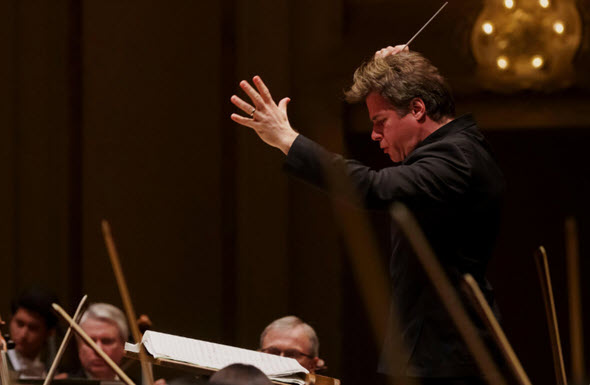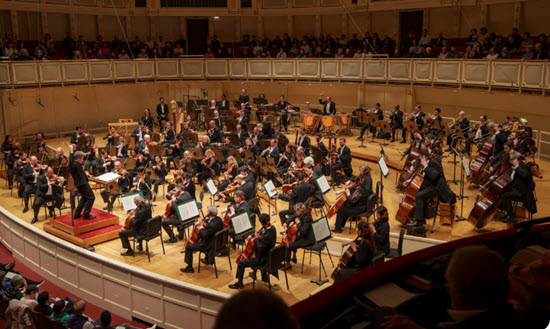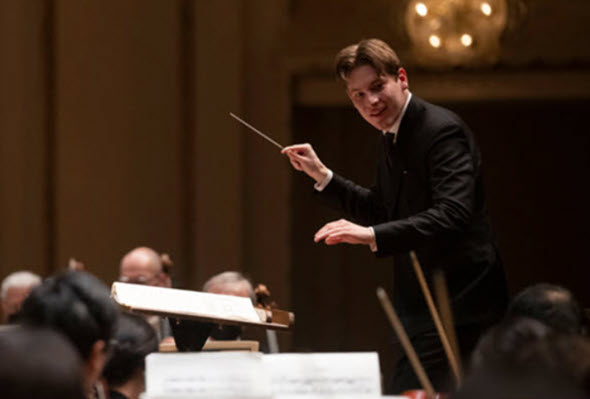Jakub Hrůša’s rare moment at Orchestra Hall captured Chicago Symphony’s bright outlook
Commentary: After leading a stupendous Shostakovich 11th, the Czech conductor had a few words to say to his cheering audience.
By Lawrence B. Johnson
So compelling, so brilliant and transformative, was Czech conductor Jakub Hrůša’s collaboration with the Chicago Symphony Orchestra on March 20, in Shostakovich’s massive Symphony No. 11 in G minor (“The Year 1905”), an existential reflection on the disastrous peasant appeal to the czar of Russia for relief from their starvation, that I decided on the spot to go back to hear it again. My return two nights later brought a serendipitous and phenomenal bonus.
If anything, the March 22 reprise, urgent and clamorous and deeply sad, was even more remarkable. The ovation from a virtually sold-out house was tumultuous, as it had been two nights earlier. It seemed as if no one thought of heading for the exits. Some 2,500 people stood and clapped and shouted as Hrůša acknowledged soloists and instrumental groups and took his own bows. Then a rare thing happened. The conductor put up his hands to quiet the crowd, and he spoke. Among major league orchestras, conductors hardly ever address their listeners. They may press hands to heart or wave goodnight, but they don’t speak. Hrůša, however, had something to say that mattered to him.
“Keep coming back to this place,” he said. “Keep coming to hear this great orchestra. Your response has made me profoundly happy. And personally, I can’t wait to come back next year again.”
Hrůša, 43, music director-designate of London’s Royal Opera House, has emerged among the world’s preeminent conductors and has established himself as a favorite with the Chicago Symphony and its patrons. He doesn’t come for one week each season, he comes for two – like the veteran Esa-Pekka Salonen, music director of the San Francisco Symphony and by now part of the CSO’s extended family. Add the likes of Lahav Shani, 36, music director of the Israel Philharmonic, and Manfred Honeck, longtime music director of the PIttsburgh Symphony, to this orchestra’s mix of extraordinary guest conductors and you have quite a supporting cast around the Chicago Symphony’s music director-designate, Klaus Mäkelä, who officially takes on that mantle in September 2027 when he will be 31 years old.
In short, the Chicago Symphony – recipient last December of a $50 million gift from the Zell Family Foundation – has transitioned from the blight of the pandemic and the artistic nourishment of Riccardo Muti’s 13-year directorship in very good shape. The alluring balance of this season finds Mäkelä on the podium for two weeks, Jaap van Zweden conducting Mahler’s Sixth and Seventh Symphonies and Muti capping it all with concerts featuring principal trumpet Esteban Batallán and finally the Verdi Requiem. (Batallán, who may be without peer among orchestral trumpet players but who had taken a leave to test the waters with the Philadelphia Orchestra, has decided to make Orchestra Hall his home after all.)
And next season is a model of planning and packaging. Mäkelä will be here for four weeks and lead his first CSO tour, an eastern U.S. swing that includes Carnegie Hall in New York. Muti also will conduct four programs and take the orchestra on a western U.S. jaunt. Salonen is booked for two weeks. Hrůša returns for two weeks in the spring of 2026. While his first appearance has a rather German centrist aspect – Schumann’s Symphony No. 1 (“Spring”) and Beethoven’s Piano Concerto No. 3 with Leif Ove Andsnes – his second visit possesses a sort of macabre magic: Janáček’s Overture to his opera “From the House of the Dead,” Rachmaninoff’s “The Isle of the Dead,” Richard Strauss’ Four Last Songs (with soprano Corinne Winters) and Wagner’s Prelude and Liebestod from his opera “Tristan and Isolde.”
The tension and drama Hrůša brought to Shostakovich’s 11th Symphony, the expressive finesse and sheer power he elicited from the CSO, brought to mind the potent mindscape he conjured in Mahler’s Ninth Symphony at Orchestra Hall two years ago. Conducting of such clarity and conviction feels almost like co-authorship, which indeed lies at the essence of interpretive art.
The word in the chat rooms is that the CSO committee charged with finding a successor to Muti was torn between Mäkelä and Hrůša, but decided to go all in with youth and grab the ascendant Finn, who already had signed on as principal conductor-designate with the Amsterdam Concertgebouw Orchestra, also effective in September 2027. Hrůša might seem like a natural as principal guest conductor for the CSO, but orchestra president Jeff Alexander has said on several occasions that the organization doesn’t feel the need for a titled principal guest. He has a point, actually. The lineup of conductors coming next season is a resonant list.
One of them silenced a roaring audience to declare his eagerness to come back again. Jakub Hrůša can be sure there will be another throng on hand to make him profoundly happy. Every night, no doubt. Times are good at Orchestra Hall.




